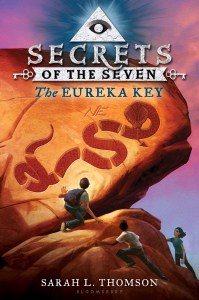McArthur School
 Last Friday I did a round of poetry workshops with some of the classes at a McArthur Elementary. I snapped a picture of this fabulous quilt hanging up in the main office.
Last Friday I did a round of poetry workshops with some of the classes at a McArthur Elementary. I snapped a picture of this fabulous quilt hanging up in the main office.
I loved the energy and excitement of the kids as they listened to poems and tried writing their own. Especially the Asian girl who earnestly asked for the right English adjective to describe quick, happy, upbeat music (she was pleased with my suggestion of “lively”) and then proudly read her poem aloud in her tentative English; the Hispanic girl who wrinkled her nose a bit at my Spanish accent but still smiled at me to make sure she wouldn’t hurt my feelings; the Caucasian boy who squirmed throughout my presentation until I thought he was bored out of his skull and then blew me away with one of the best poems I’ve heard; the Middle Eastern girl who hugged me and said she could now check “hugging an author” off her bucket list.
It was lovely to see all these bright, eager, American face light up with joy to be talking about artwork and writing poems.
Read MoreOn Book Tour (Really?)
As I type, I’m on a plane heading off for my very first book tour, to promote The Eureka Key. I’m quite startled by this occurrence. I mean, I knew it was going to happen; I’ve seen the itinerary and everything. But I can’t help but suspect that the book police will pick me up sometime soon for impersonating the kind of author who’s successful enough to have book tours.
Now that I’ve landed in Alexandria, Virginia, and taken a little stroll around the Old Town neighborhood, I can report that I’ve seen: handmade rugs that make my brain spin with the idea that somebody crafted something so glorious TO BE WALKED ON, a life-sized plastic horse in the back of an old-fashioned pickup truck, and a white-haired gentleman playing clarinet inside his (closed, locked) jewelry repair store.
I like this neighborhood.
Read MoreWriting Tips
I am putting together a list of writing tips to use with schools when I do author visits. Perhaps you’d like to hear them?
Sarah L. Thomson’s Eight Best Tips for Becoming a Better Writer
First drafts MUST be MESSY.
Leave space in a first draft (skip lines) so there is room to revise.
For a second draft—don’t try to write it better. Write it different.
Stuck for something to write about? Take a story or an idea everybody knows (Cinderella and her stepsisters? Witches on broomsticks?) and CHANGE it.
Want to be a writer? Do these two things. Read A LOT. And try to finish whatever you write. Getting to the end gets easier with practice.
Alliteration (using words with the same letter sounds) is fun.
Plot outlines can solve the dreaded “I’m stuck in the middle of the story and I can’t finish it” problem.
I’ve done twenty drafts of some books. Two or three should be no problem.
Read MoreTell Me Your Author Visit Stories
Dear Fellow Authors and Illustrators,
Later this fall, I am going to be speaking at the AAASL (American Association of Awesome School Librarians)–oops, I might have slipped an extra “A” in there. I’ll be telling the cool librarians how they can work with authors, illustrators, teachers, staff, students, and families to get the most out of an author or illustrator visit.
If you’re a veteran of school visits, you probably know that subtle but real feeling of excitement when you walk into a school that’s READY. Maybe there’s a cool display up on a wall; maybe a kid does a double-take and gasps, “Are you the author?” (or as it often comes out, “Are you the Arthur?”). Or maybe there’s just a feeling in the air, and you know it’s going to be a good visit. The kids will be excited and engaged; the teachers will be interested; each presentation will seem too short.
Do you have any stories about schools that have done a great job creating this kind of energy and excitement? What have librarians or teachers done to get their students to the point where they are revved up about what you have to share and ready to put it use in their own creative work? What, to you, makes a GREAT school visit different from a ho-hum one? Please share in the comment section, and let me know if it’s okay to use your story in my talk.
Thank you!
Read More





